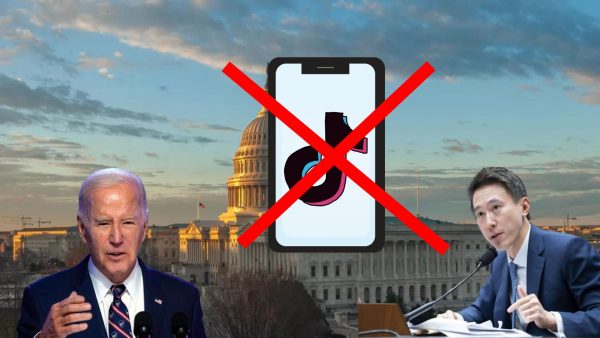Firearm regulations cause controversy
Oregon’s Measure 114 faces lawsuits after being passed by voters
Measure 114 aims to reduce gun violence rates in Oregon by banning the sale of large-capacity magazines and installing mandatory background checks before firearm purchases.
As mass shootings and other forms of gun violence rates rise, gun control continues to be a strongly debated subject. In 2022, the CDC reported 45,222 gun related deaths in the U.S. So far in 2022, the U.S. has exceeded records in school shooting numbers. Under the second amendment, every American has the constitutional right to bear arms, so how is it decided when regulations are necessary?
Gun control is not a new debate— restrictions on gun purchase and usage have existed on the federal level since the beginning of American history. The National Firearms Act of 1934, regulating the manufacture, sale, and possession of fully automatic firearms was approved by Congress. From 1994 to 2004, the Violent Crime Control and Law Enforcement Act of 1994 banned 19 semi-automatic assault rifles as well as large capacity magazines. However, it was renewed once the legislature expired. Introducing similar legislature is being debated across the nation.
In the recent midterm elections, Oregon voters passed measure 114. This new measure requires a police-issued permit and federal criminal background check on all purchases, as well as a mandatory gun safety course. It also bans the sale of magazines, which hold ammo, that hold more than 10 rounds of ammunition. However, it does make exceptions for those who already own larger magazines.
This measure has one main goal: reduce gun violence rates in Oregon. This pertains to both homicides and suicides. It aims to do so by preventing impulse gun purchases through a built-in waiting period (the time needed to obtain a permit and safety course) which has been shown to prevent suicide in numerous cases. The comprehensive background check helps to keep guns out of the hands of potentially dangerous individuals— in almost all cases of recent mass shootings, background checks could have prevented tragedies.
The measure passed by a 50.83% majority after months of lobbying from both sides. Lift Every Voice Oregon (LEVO) garnered over 160,000 signatures to place measure 114 on the ballot this fall, but many were not convinced.
A federal lawsuit to prevent measure 114 from becoming law has been filed. The lawsuit was filed against Gov. Kate Brown and the state’s Attorney General Ellen Rosenblum by the Oregon Firearms Federation, the Sherman County Sheriff, and a Marion County gun store owner. The lawsuit specifically takes issue with the ban on large magazines.
The Oregon Firearms Federation argues that the new measure not only violates the second amendment, but also Oregon’s constitution. The lawsuit argued, “the only thing the ban contained in 114 ensures is that a criminal unlawfully carrying a firearm with a magazine over 10 rounds will have a potentially devastating advantage over his law-abiding victim.”
Dr. WJ Mark Knutson, who works with LEVO, responded to the lawsuit’s concerns about magazine bans. “Those who already have them, it already says they would keep them, could use them on their property or at shooting ranges — so nobody’s taking away anybody’s guns, or their magazines,” Knutson told KGW.
A decision on the lawsuit is expected to be made by Dec. 8, when the measure is supposed to go into effect. The specifics of who controls permits and safety courses, and what precisely that means, still need to be sorted out. However, there’s still a ways to go before the general public sees the effects, even if the judge decides in favor of the measure.
Your donation will support the student journalists of West Linn High School. Your contribution will allow us to continue to produce quality content by purchasing equipment, software, and continuing to host our website on School Newspapers Online (SNO).

Kaelyn Jones, junior, has been involved with wlhsNOW since her freshman year. As the first multimedia editor, she hopes to push podcasting and broadcast...


























![Game, set, and match. Corbin Atchley, sophomore, high fives Sanam Sidhu, freshman, after a rally with other club members. “I just joined [the club],” Sidhu said. “[I heard about it] on Instagram, they always post about it, I’ve been wanting to come. My parents used to play [net sports] too and they taught us, and then I learned from my brother.”](https://wlhsnow.com/wp-content/uploads/2024/03/MG_7715-2-1200x800.jpg)





![The teams prepare to start another play with just a few minutes left in the first half. The Lions were in the lead at halftime with a score of 27-0. At half time, the team went back to the locker rooms. “[We ate] orange slices,” Malos said. “[Then] our team came out and got the win.”](https://wlhsnow.com/wp-content/uploads/2023/10/IMG_2385-1200x800.jpg)





![At the bottom of the third inning, the Lions are still scoreless. Rowe stands at home plate, preparing to bat, while Vandenbrink stands off to the side as the next batter up. Despite having the bases loaded, the team was unable to score any runs. “It’s just the beginning of the season. We’re just going to be playing out best by June, [and] that’s where champions are,” Rowe said.](https://wlhsnow.com/wp-content/uploads/2024/03/IMG_3077-1200x900.jpg)
















































































